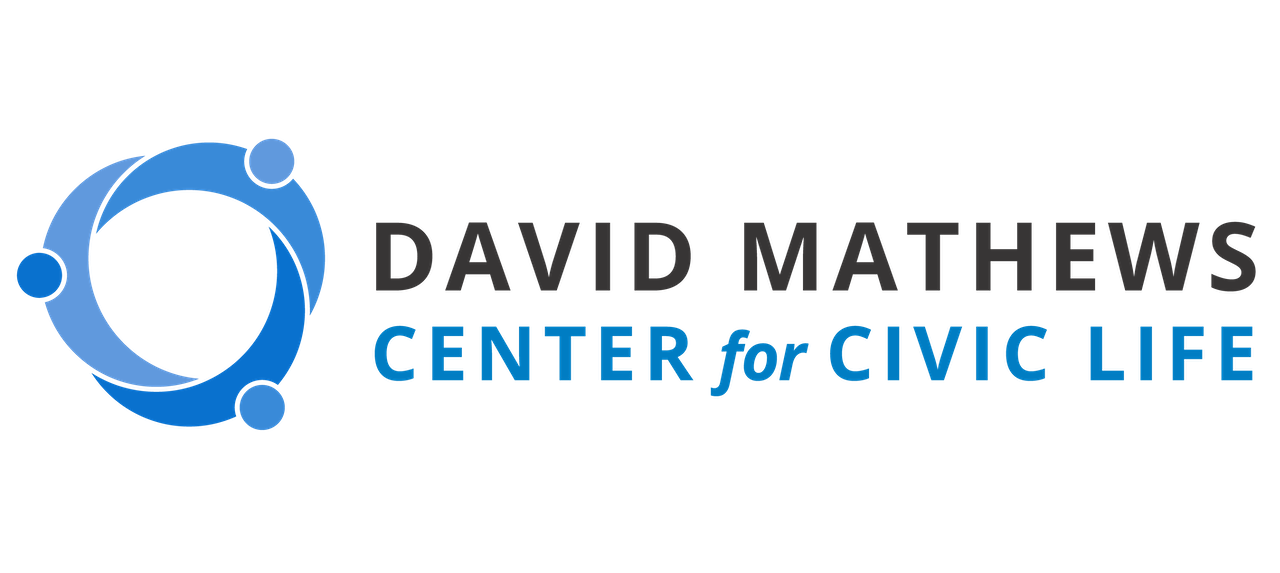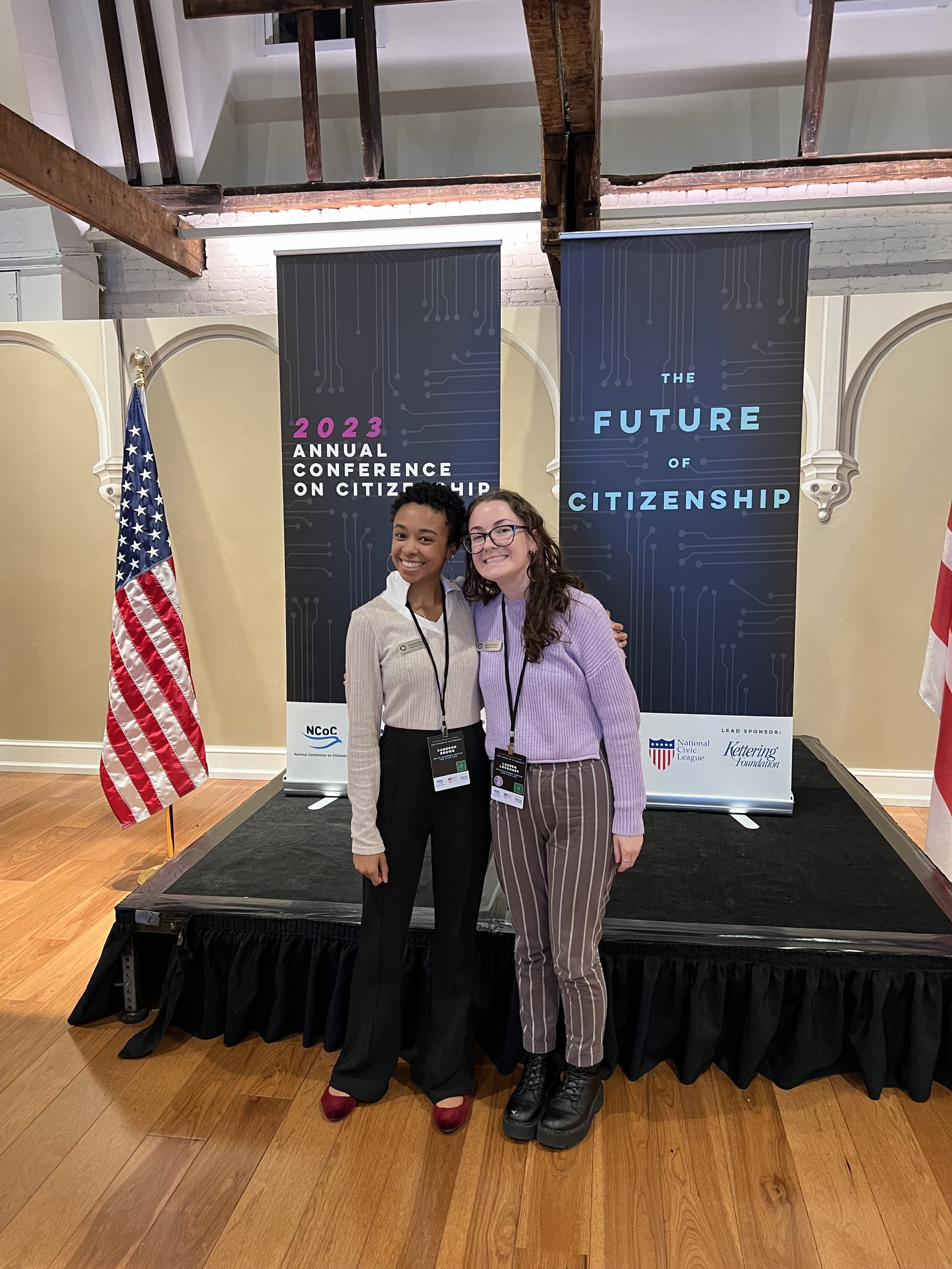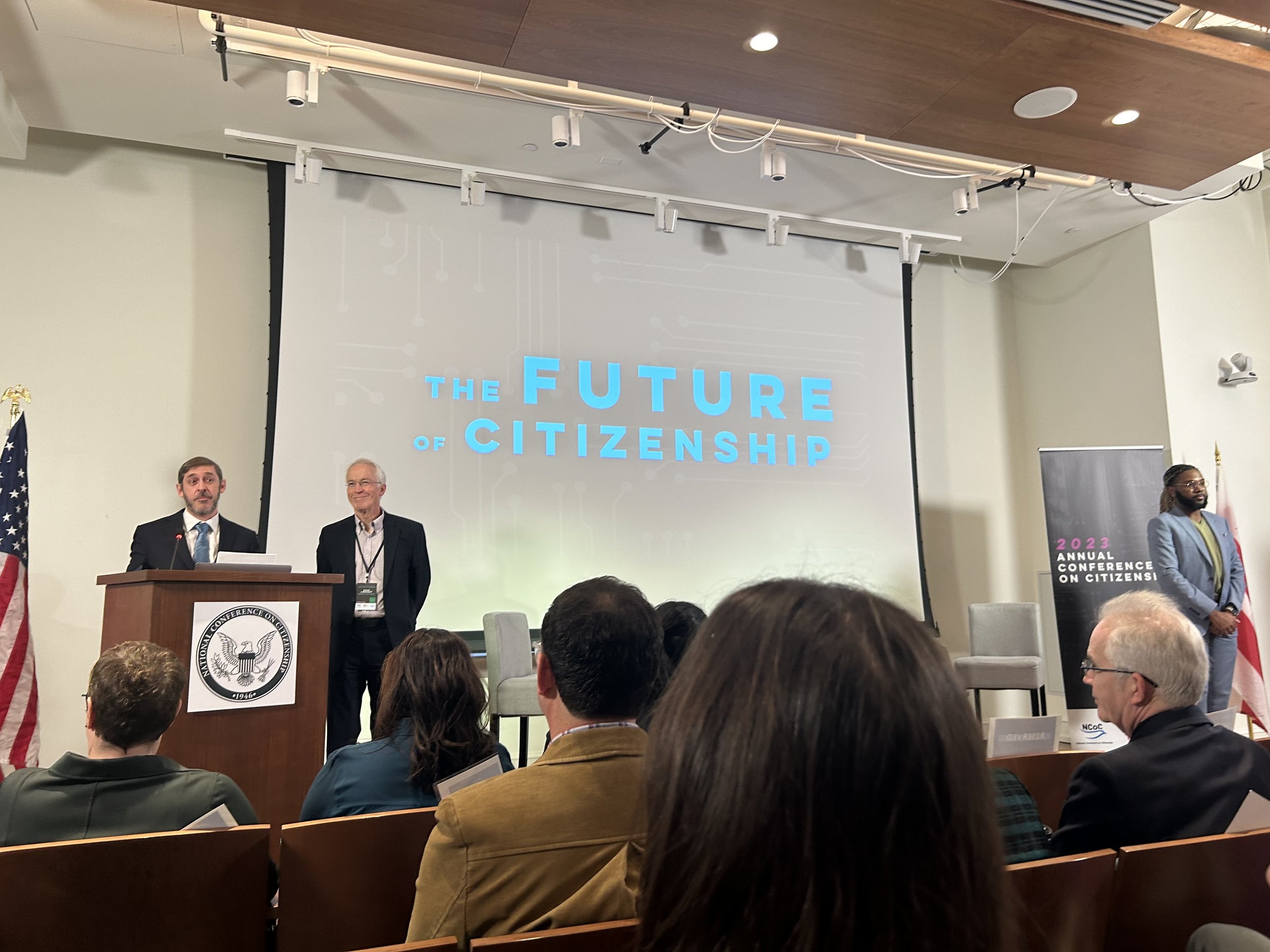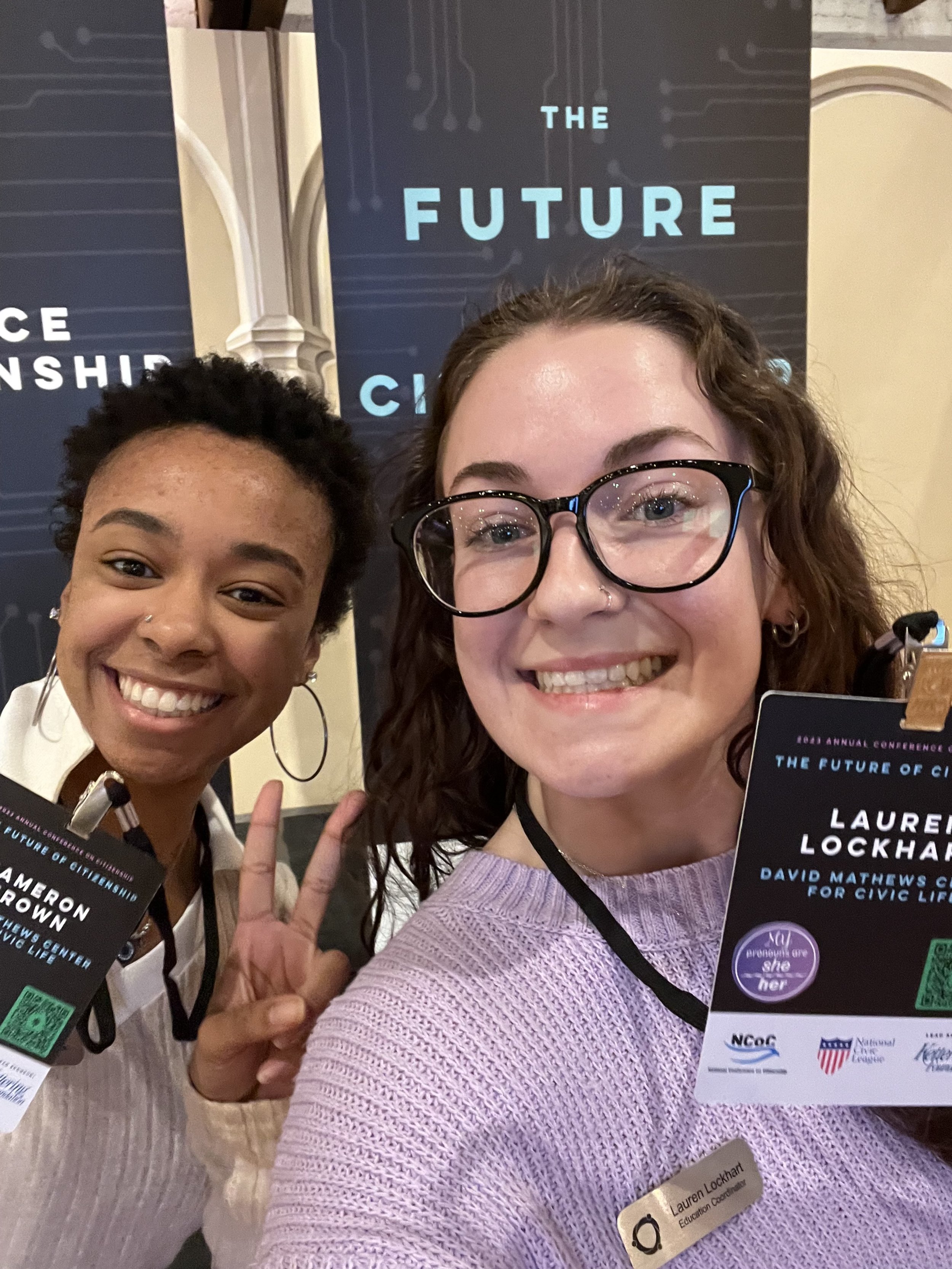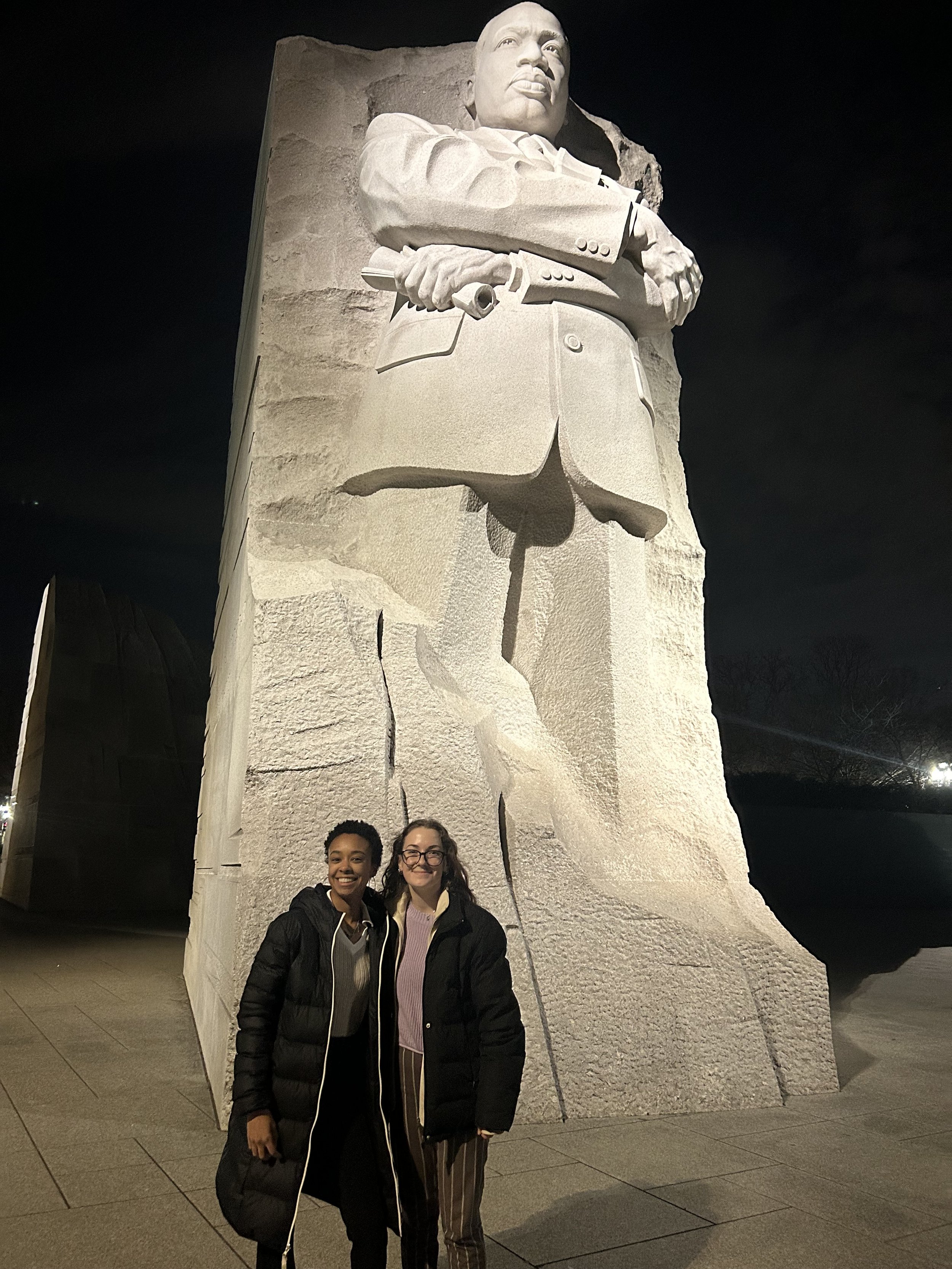Tomorrow's Voices: David Mathews Center at the National Conference on Citizenship"
On Thursday, November 30th the Mathews Center attended the 2023 Annual Conference on Citizenship in Washington, DC at the Planet Word Museum. This annual conference is held by the National Conference on Citizenship (NCoC). The NCOC is a congressionally chartered nonprofit dedicated to advancing civic life in America. This year’s theme was "The Future of Citizenship” which focused on and delved deep into topics regarding the future of democracy and citizenship in the United States. The conference covered topics on the future of news media, volunteerism, nonprofits, Generation Z, Artificial Intelligence, and more. The DMC team truly enjoyed the time in Washington, DC, and are glad to have had the experience.
The day started at 8:00 a.m. with a light breakfast and the opportunity to network and engage with conference participants. After breakfast, the conference started with welcoming remarks in the Planet Word Museum’s auditorium. Welcoming remarks were given by Valerie Lemmie, Senior Advisor for State and Local Government, Kettering Foundation, and Board Member for the National Conference on Citizenship, and National Civic League. Cameron Hickey, CEO of, the National Conference on Citizenship, also gave a warm welcome to all of the attendees giving a very bright start to the day.
Following the welcoming remarks the conference held its first plenary session in the auditorium titled “Citizenship and Artificial Intelligence.” The morning plenary gave the space for a real conversation about the immediate and long-term implications that AI may have on democracy. This conversation was extremely informative and it gave a space for many to learn about how AI is being used and how it may affect citizenship in the future.
After the morning plenary, the conference went into its first breakout session. The first session was on three different topics, “The Future of Civic Learning”, “Investing in the Future of Democracy”, and “Using Data to Measure Civic Health and Impacts.”
Being one of the only national priorities with broad bipartisan support, civic education has become more important than ever. But what do citizens need to know, what skills should they have, and how can we best support that learning? These are some of the questions that featured speakers Raj Vinnakota, President, Institute for Citizens & Scholars, Louise Dubé, CEO, iCivics, David Bobb, President, Bill of Rights Institute, and Moderator David Sander, Mayor, Rancho Cordova, CA, “The Future of Civic Learning” elaborated upon during The Future of Civic Learning panel.
As time has progressed, we have continued to see a rise in political homogeneity between couples and families, creating a greater sense of individualism and a need to interact with others in meaningful ways that challenge our beliefs. Amidst this, a survey from the Bill of Rights Institute shows that young people (age 18-24) are two times as likely to engage with others that are not as “tribal” to them and a majority of them do not align with either political party, focusing on solutions-oriented mindset. So in a system where these conversations are not easily accessible, how and where are students and young people interacting with others to cultivate a sense of collectivism? While acknowledging that civic work and preparedness needed to be established outside of education, panelists agreed that more emphasis needed to be placed on adapting and supporting the systems we do have in place, such as K-12 and higher education institutions.
Some efforts, such as at iCivics, focus on creating a network of state-level coalitions, networking individual efforts with common interests. Though legislation helps to strengthen civic education in each state, all continue to face a similar hurdle in a time of peak mistrust in government: reestablishing educational institutions as nonpartisan spaces for deliberative conversation and a diversity of viewpoints. This starts with the school boards, teachers, and parents, reknitting bonds at the local level, working together to ensure students are civically prepared and creating accountability for those preventing this. Additionally, professional development for educators has opened up many opportunities for civic growth in K-12 schools; however, individuals within higher education institutions may encounter more challenges in accessing these same prospects. By strengthening these establishments at the core of our communities, we ensure a pathway for civic thinking amongst the younger generation.
The third breakout session, “Using Data to Measure Civic Health and Impacts” featured Allison Plyer, Chief Demographer at the Data Center and Author of Pandemic to Prosperity, Jessica Sutter, Chief of Learning Initiatives at the Institute for Citizens & Scholars, Laura Schlachter, Survey Statistician at AmeriCorps and Moderator, Joe Hoereth, Director at the Institute for Policy and Civic Engagement. This session included very informative infographics and data sets. It also highlighted the importance of how data can help to promote and make policy decisions as well as support advocacy. In her presentation, Allison Plyer mentioned that it is important for advocacy data to be simple and easily articulated to the media and policymakers. She mentioned it also should be simple so it can be used as correlation data in other related research. This is important to emphasize because formulating data to be quickly articulated will allow the statistical information on civic health to be easily accessible to others.
Laura Schlachter presented following Allison Plyer and displayed data from Americorps. Schlachter presented on Americorps’ current population survey as well as their Civic Engagement & Volunteering Supplement (CEV). This survey takes the “pulse” of the country's civic health every year by merging the Civic Engagement and Volunteering survey into one. The CEV is a critical piece of measuring civic life in America overall. Finally, Jessica Sutter presented data on the civic preparedness of Generation Z. She also emphasized the importance of packaging data in a way that is easy for others to use for a variety of other issues, and engaging local communities/partners on the front end of the work before reporting out for data collection. The session was only an hour long but filled with a lot of informative topics that directly relate to civic health in the United States.
The day continued with two more afternoon plenaries. The first one, ‘Mapping a Healthy Democracy Ecosystem” provided resources and a tool that maps organizations, connections, finances, and ideas of the healthy democracy ecosystem. The second-afternoon plenary took place during lunchtime. This plenary titled “Structural Reforms for the Future of Democracy” discussed threats and promising solutions to our democracy that are unfolding at the state level. It featured many representatives from the state of Ohio to provide their points of view on how things are being affected at the state level. Panelists included Maureen O’Connor, Former Chief Justice of the Supreme Court of Ohio and Senior Fellow, of the Charles F. Kettering Foundation, David Pepper, Former Chair of the Ohio Democratic Party and Senior Fellow, Charles F. Kettering Foundation and moderator Sharon L. Davies, President and CEO, Charles F. Kettering Foundation.
Following lunch were three more breakout sessions that included a variety of topics relating to the future of citizenship such as nonprofit local news, service and civic engagement, empowering local elections, and many more. The session “Service and Civic Engagement for the Next Century” during breakout session 3 was an extremely informative session to be a part of. This session discussed recent challenges volunteer organizations have been faced with such as inflation, technology, diversity and inclusion challenges, and more.
The session also discussed many different possible solutions on how they felt they could improve their organizations' functionality, as well as the concern on how newer technology such as AI will affect communities of color. This panel featured Michael Smith, CEO of AmeriCorps, and Virginia Kase Solomón, CEO. League of Women Voters, moderated by Doug Linkhart, President of the National Civic League. It was an extremely informative session and a crucial topic that warranted an in-depth discussion.
In conclusion, the 2023 NCOC Annual Conference proved to be a success, offering extensive insights and valuable information. The DMC team had a blast being part of it and is excited about working more with the NCOC in the future.
